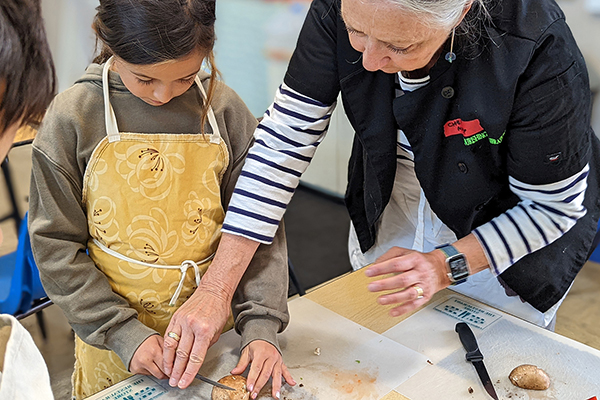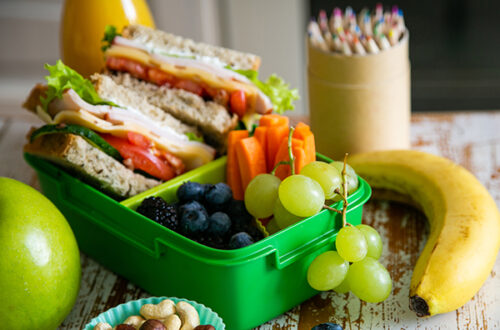
Growing Healthy
Generations: Nourished
By Suki Wessling

The stakes for teen foster youth are high. Once they reach eighteen, they leave the system. Unless they were lucky to be placed with families who taught them solid life skills like cooking, they enter adult life knowing little about food.
“To your stations!”
The children come into the room full of playground energy and loud voices. They chatter as they don their aprons and wash their hands. But as soon as they’re assigned to their stations they become as focused on their tasks as a chef in a restaurant.
Because these kids are chefs
Their Live Oak classroom has been turned into a kitchen where the kids wear aprons, use knives, and make healthy food together.
“I was having a conversation at Live Oak with the woman who is the Director of Childhood Education and she said that their Wellness plan had no nutrition education listed in it at all,” remembers Nourishing Generations Executive Director Karen Haralson. “There’s no time set in the course of the day or in any curriculum that they teach nutrition.”
That’s when the Nourishing Generations staff and volunteers joined the Live Oak afterschool program, where kids learn about nutrition through games and cooking—hands-on learning that really soaks in. With the CORE grant they just received, they are strengthening a program that children in the district look forward to year after year.
Spreading the word about nutrition
Nourishing Generations, originally started at Bowman College by nutritionists and chefs with a sense of community, has a single purpose that it now spreads in several directions.
“We invented ourselves and got our own 501(c)3, and that’s when we just started rock and rolling and started expanding beyond children,” remembers Nancy Birang, cofounder of the organization who is now the board president. “We started going to other members of our community who needed the same type of support.”
Those community members now include families in low-income housing, women with cancer, and young adults who are transitioning out of foster care.
“I have found over the years that I can’t just assume that people know anything about nutrition or about cooking,” Nancy explains. “One of the best questions I ever got was from one of the transition-age foster youth. They said, ‘Do you need to eat fat?’ And it was such a great question, because there’s this taboo around fat.”
The stakes for teen foster youth are high. Once they reach eighteen, they leave the system. Unless they were lucky to be placed with families who taught them solid life skills like cooking, they enter adult life knowing little about food. And food choices can make all the difference, Karen explains. Diabetes is a national epidemic, and we spend enormous amounts of healthcare money on it. But early dietary interventions are much cheaper and more effective in the long term.
“These types of diet lifestyle intervention programs are not glamorous and they don’t generate profit,” Nancy points out. “They take money, but it’s been proven that it’s just as effective as taking medication.”
The problem, however, is the system. Nonprofits or graduate students get short-term grants to do well-meaning work in their communities, and then the funding dries up.
“You’ll go in for six weeks, do a program with a group of kids, collect some data. And then this person gets their Ph.D.”
It’s the dirty work that sticks
“It’s a kinesthetic mode of learning, for kids it’s best,” explains Darcy Chown, the All-Site Supervisor for Afterschool Programs in Live Oak. “Once they’ve done it, they can do it again. Whereas if you’re just telling them about it, or they’re just watching, they’re not quite sure.”
Darcy says this standing over a table full of elementary school kids using knives. They use the tools carefully, seriously, and sometimes skillfully. One boy says he makes tamales with his grandma. Another struggles to choose which hand should hold the knife. It’s clear which kids cook at home, but even the kids who don’t are game to try and open to suggestions.
At another table, kids are grating cheese with sharp hand graters, and at another, one girl lovingly pats her raw pizza dough over and over, delighting in its yeasty cushiness.
Volunteer Alexis Underwood, a retired teacher, says the pay-off is what she hears from the parents. “Taking their mom shopping and saying, ‘Don’t buy me this. Let’s buy these vegetables and fruit’.” One of the parents reported that her child wouldn’t go to bed until she’d eaten every color of the rainbow.
Supporting cancer treatment with nutrition.
In collaboration with WomenCare, NG works with women on ways that they can support their return to health through nutrition. This program has also been threatened with Covid-related funding cuts, when local big spending foundations like PAMF started sending their money in other directions.
But just like working with kids, the payoff for the small investment is huge.
“If you have a cancer diagnosis, you go on this rollercoaster ride of treatments and side effects and you go from appointment to appointment to appointment and you feel so powerless and out of control,” Nancy says. “So what is under your control? What you eat and what you drink.”
“We’re not going to get rich doing this!”
In the end, the staff at Nourishing Generations—both paid and volunteer—do their work with a sense of devotion to their cause. They go out into the community and see firsthand how important their programs are to individual people.
Karen will never forget a child she worked with in Watsonville.
“We went in and it was pretty chaotic—there were a couple children with special needs but we were just treating them the same as every other child. The teacher came in afterwards and he says, “I’ve never seen that child focus on anything, you know this child has special needs and behavior issues.”
“They just never gave him a chance.”
For more information: Learn more at NourishingGenerations.org. Even if your child is not in the program, you can access their fun cooking instructional videos through their website.
Suki Wessling is a local writer and mom of two young adults who love to cook. You can listen to the podcast of the interview she did with Nancy and Karen at The Babblery: Babblery.com.


You May Also Like

Missing Van
July 31, 2022
Morning Routines
August 6, 2022

